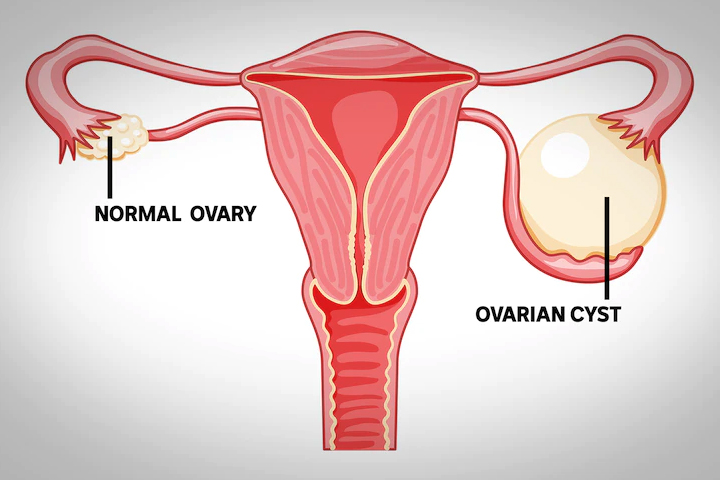
Ovarian Cysts
Ovarian cysts are fluid-filled sacs that can develop within or on the surface of the ovaries. They are a relatively common condition in women of reproductive age and can occur for various reasons. In many cases, ovarian cysts are harmless and resolve on their own without causing symptoms. However, some cysts can become problematic, leading to pain, discomfort, or complications.
Types of Ovarian Cysts:
- Functional Cysts: These are the most common type of ovarian cysts and are related to the normal functioning
of the ovaries during the menstrual cycle. There are two main types of functional cysts:
- Follicular Cysts: These occur when a follicle (the structure that releases an egg during ovulation) doesn't rupture or release an egg as it should. Instead, it continues to grow, forming a cyst.
- Corpus Luteum Cysts: After the release of an egg during ovulation, the follicle transforms into a structure called the corpus luteum. Sometimes, the corpus luteum can fill with fluid, leading to the formation of a cyst.
- Dermoid Cysts: These cysts are more uncommon and can develop from cells that produce human eggs. They may contain various types of tissue, including hair, skin, teeth, or even fatty material.
- Endometriomas: Endometriomas are cysts that form in women with endometriosis, a condition where the tissue that normally lines the inside of the uterus (endometrium) grows outside the uterus, often on the ovaries and other pelvic organs.
- Cystadenomas: These cysts form from the cells on the outer surface of the ovary and can be filled with watery or mucous-like material.
Symptoms and Complications:
Many ovarian cysts do not cause any symptoms and are discovered incidentally during routine pelvic exams or imaging studies. However, some women may experience the following symptoms:
- Abdominal or pelvic pain, which can be dull or sharp and may be more pronounced during menstruation.
- Bloating or abdominal swelling.
- Changes in menstrual patterns.
- Pain during intercourse (dyspareunia).
- Pressure on the bladder, leading to increased frequency of urination.
- Nausea or vomiting if the cyst causes torsion (twisting of the ovary) or ruptures.
Complications can arise if the cyst becomes large, ruptures, causes twisting of the ovary (ovarian torsion), or is suspected to be cancerous.
Diagnosis and Treatment:
Ovarian cysts are often detected during routine pelvic exams or when imaging studies, such as ultrasound, are performed for other reasons. If a cyst is found, the doctor may recommend further tests to determine its type, size, and whether it's causing any symptoms.
Treatment of ovarian cysts depends on several factors, including the type of cyst, its size, and whether it is causing symptoms. In many cases, small functional cysts will resolve on their own within a few menstrual cycles. Your doctor may recommend watchful waiting and repeat imaging to monitor the cyst's status.
If the cyst is causing significant pain, growing larger, or showing concerning features, the following treatment options may be considered:
- Medications: Hormonal birth control pills may be prescribed to prevent the formation of new cysts or reduce the size of existing ones.
- Surgical Removal: If the cyst is large, causing severe symptoms, or suspected to be cancerous, your doctor may recommend surgery to remove it. This can be done laparoscopically (minimally invasive) or through open surgery, depending on the cyst's characteristics and your overall health.
- Ovarian Cystectomy: In cases where the cyst is benign and preserving the ovary is essential (especially in younger women who wish to maintain fertility), a cystectomy may be performed. This procedure involves removing only the cyst while leaving the rest of the ovary intact.
- Oophorectomy: In some cases, if the cyst is large, the entire ovary may need to be removed. This procedure is called an oophorectomy.
It's important to note that the majority of ovarian cysts are non-cancerous (benign). However, if there are concerns about the cyst's nature, your doctor may recommend additional tests or refer you to a specialist.
If you experience any symptoms or have concerns about ovarian cysts, it's essential to seek medical advice promptly to determine the appropriate course of action.